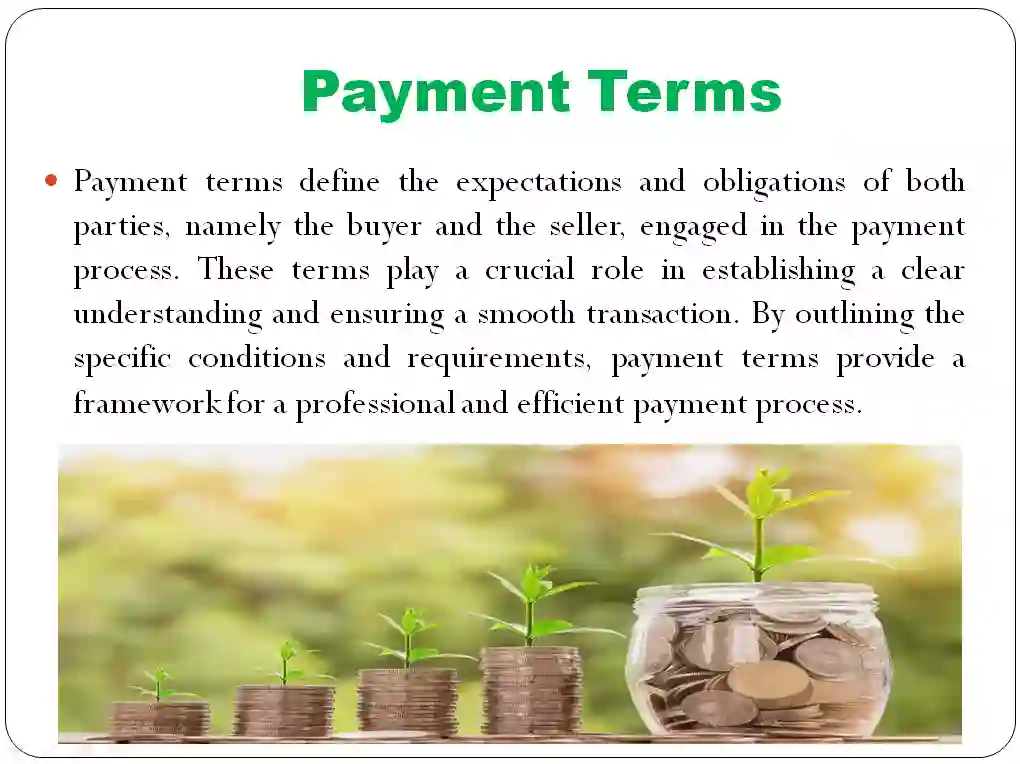Payment Terms Meaning
Several payment terms have been established to ensure a smooth and efficient financial transaction process. These payment terms outline the expectations and responsibilities of both parties (buyer and seller) involved in the payment process.
The currency of our country is not a legal tender in other countries and hence it will not be accepted abroad in the discharge of debts and obligations. All importers face the problem that their exporters in other countries require payments in their homeland currency. So, importers have to arrange for this. This problem is mainly solved by banks, foreign exchange dealers, brokers, etc.
Also, the importers are faced with the problem of transferring the foreign exchange to their exporters and trading parties in other countries. To solve this problem, various devices have been introduced. These devices are called instruments for making foreign payments and these ensure the safe, speedy and reliable transfer of money from one country to another.
To succeed in today’s global marketplace and outperform foreign competitors, exporters must offer their customers appealing sales terms, backed by suitable payment methods. Because getting paid in full and on time is the ultimate goal for each export sale, an appropriate payment method must be chosen carefully to minimise the payment risk while also accommodating the needs of the buyer. There are four primary payment methods commonly used for international transactions. During or before contract negotiations, one should consider which method is mutually desirable for both him and his customer.
Related Articles:
- nature of business meaning
- nature of international business
- scope of international marketing
- determinants of economic development
- nature of capital budgeting
- nature of international marketing
Types of Payment Terms
In export payment for the goods can be made using any of the following methods of payment, also known as payment terms which are as follows:
| Payment Method | Where Used | Advantages to Buyer | Advantages to Seller |
| Cash in advance | New relationships. Smaller transactions. Buyer unable to obtain L/C. | May obtain lower prices due to reduced credit risk for the seller. | Eliminates the risk of non-payment. |
| Open account | |||
| Letter of Credit | |||
| When the seller needs L/C to obtain financing. | May obtain lower price due to reduced credit risk for the seller. | ||
| Documents against payment | |||
| Documents against acceptance | |||
| Consignment Sale |
Cash in Advance
Cash in advance affords the exporter the greatest protection because it ensures that payment is received either before shipment or upon arrival of the goods. This method also allows the exporter to avoid tying up its funds. Although less common than in the past, the practice of making cash payments upon document presentation remains widespread.
Receiving payment by cash in advance of the shipment may appear to be an optimal arrangement. In this situation, the exporter is relieved of collection problems and has immediate access to the money. A wire transfer is generally used and has the advantage of being nearly immediate. Payment by check may lead to a delay in collection, potentially taking up to six weeks. Therefore, this method may defeat the original objective of securing payment before shipment.
Under this method, the exporter receives payment from the overseas importer in advance in the form of a demand draft or cheque denominated in foreign currency or by way of direct telegraphic transfer against the supply of goods to be delivered at a later date. In case of huge payments in advance, the importer requires the provision of an advance payment guarantee from a bank. It is the most secure payment method from the exporter’s point of view. Exporters may ask for advance payment only when they find themselves in a strong trading position and can dictate terms in case the particular product is not available elsewhere. However, the importer would be willing to make advance payment if he could rely on the integrity of the exporter.
Open Account
In a foreign transaction, an open account can be a suitable method of payment, particularly when the buyer is well-established, possesses a lengthy and favourable payment record or has been thoroughly checked for creditworthiness. Open account is concerned with credit sales when the importer makes payment on a pre-determined future date. The exporter directly exports the goods to the importer.
The latter takes the delivery of the goods without completing its payment. In this case, the exporter bears the entire risk, extending credit terms only to creditworthy importers. Experience shows that one or two per cent of the export proceeds are bad debt loss. In such cases, the exporter hires an attorney or avails itself of the services of a collection agency. In both cases, cost is involved. Some of the largest firms abroad make purchases only on open accounts.
An open account is an arrangement between the exporter and the importer whereby the goods are manufactured and delivered even before the payment is required. This mode of payment provides for payment at some stated detailed future date. The importer does not accept any negotiable instrument and thus, fails to provide the exporter with any evidence of his legal commitment to make the payment. The importer makes the payment only when they have received the goods and inspected them to their satisfaction in terms of quality.
There is also the added risk emanating from the possibility that political events may impose some restrictions on the remittance of funds from the importing country to the exporter’s country. Besides, these disadvantages, the exporter will also encounter a situation where their funds remain tied up till such time the goods are received and found to be acceptable by the foreign importer.

You May Also Like:-
Theories of International Trade
International Human Resource Management
International Financial System
International Commodity Agreements
United Nations Conference on Trade and Development
International Trading Environment
Scope of International Marketing
Determinants of Economic Development
Impact of Globalisation on International Business
International Business Environment
Complexities of International Business
Difference between Domestic and International Business
Importance of International Business
Modes of Entry into International Business
Factors Affecting International Business
Major Reasons for International Business
